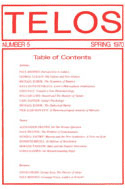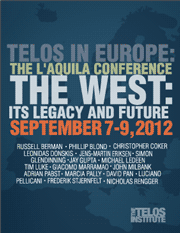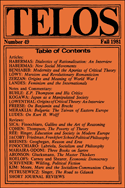By Yonathan Listik · Tuesday, November 27, 2012 As an occasional feature on TELOSscope, we highlight a past Telos article whose critical insights continue to illuminate our thinking and challenge our assumptions. Today, Yonathan Listik looks at Georg Lukács’s “The Old Culture and the New Culture” from Telos 5 (Spring 1970).
 It would be simplistic to argue that behind the Marxist critiques of capitalist society there was only an objective intention simply to improve its effectiveness and avoid the political complications found in capitalist society. Despite its strict scientific tone, Marxism still carries a heavily moral intention. This is what Georg Lukács comes to argue in this essay on culture. In his analysis of capitalist cultural structure and its many differences from capitalist reality, Lukács points to what he regards as the ultimate goal behind communism: a new cultural order. It would be simplistic to argue that behind the Marxist critiques of capitalist society there was only an objective intention simply to improve its effectiveness and avoid the political complications found in capitalist society. Despite its strict scientific tone, Marxism still carries a heavily moral intention. This is what Georg Lukács comes to argue in this essay on culture. In his analysis of capitalist cultural structure and its many differences from capitalist reality, Lukács points to what he regards as the ultimate goal behind communism: a new cultural order.
Continue reading →
By Sevgi Doğan · Monday, November 26, 2012 This paper was presented at Telos in Europe: The L’Aquila Conference, held on September 7-9, 2012, in L’Aquila, Italy.
 The argument of this paper is inspired by the actual problem of the individual in the modern state, in other words, the relationship between the political life and the individual, or the relation of the individual with politics. The thesis would claim that the individual as one of the fundamental features of modern times does not exist—or is not considered—as political agent although the modern political institution is based on the existence of the individual with its economic, social, and political rights. In this context, the individual exists only as consumer both for him/herself and for another (capitalist) and as a producer for another (capitalist) but not as a creator for him/herself. Marx talks about the production and consumption dialectic in the “Introduction” to Grundrisse (1858, published 1939). In this context a brief survey is presented here of some well-known early writings of Marx in an effort to outline how this dialectic is revealed for the difference between Marx’s and Hegel’s philosophical perspectives of the individual existence. The statement claiming that Marx does not discuss the concept of individual as Hegel does is a delusion. The argument of this paper is inspired by the actual problem of the individual in the modern state, in other words, the relationship between the political life and the individual, or the relation of the individual with politics. The thesis would claim that the individual as one of the fundamental features of modern times does not exist—or is not considered—as political agent although the modern political institution is based on the existence of the individual with its economic, social, and political rights. In this context, the individual exists only as consumer both for him/herself and for another (capitalist) and as a producer for another (capitalist) but not as a creator for him/herself. Marx talks about the production and consumption dialectic in the “Introduction” to Grundrisse (1858, published 1939). In this context a brief survey is presented here of some well-known early writings of Marx in an effort to outline how this dialectic is revealed for the difference between Marx’s and Hegel’s philosophical perspectives of the individual existence. The statement claiming that Marx does not discuss the concept of individual as Hegel does is a delusion.
Continue reading →
By Maja Sidzinska · Tuesday, November 20, 2012 As an occasional feature on TELOSscope, we highlight a past Telos article whose critical insights continue to illuminate our thinking and challenge our assumptions. Today, Maja Sidzinska looks at Joan Landes’s “Feminism and the Internationals” from Telos 49 (Fall 1981).
 Although 2012 is being hailed as the new Year of the Woman and women’s votes were solicited and cited as pivotal to the outcome of the U.S. presidential election, Joan Landes’s 1981 article “Feminism and the Internationals” provides a timely reminder about the strategic ways that women’s and feminist movements have been deployed in service of political agendas in body politics past. Landes illustrates the historical subordination of women’s and feminist concerns in socialist paradigms and states, shows that the personal was treated as apolitical, and alludes to male epistemic authority as begetting these developments. From the vantage point of Marxist socialism, the problem with feminism is that it undermines the unified class struggle by introducing a competing concern—gender—that threatens the cohesion of the socialist movement. Although 2012 is being hailed as the new Year of the Woman and women’s votes were solicited and cited as pivotal to the outcome of the U.S. presidential election, Joan Landes’s 1981 article “Feminism and the Internationals” provides a timely reminder about the strategic ways that women’s and feminist movements have been deployed in service of political agendas in body politics past. Landes illustrates the historical subordination of women’s and feminist concerns in socialist paradigms and states, shows that the personal was treated as apolitical, and alludes to male epistemic authority as begetting these developments. From the vantage point of Marxist socialism, the problem with feminism is that it undermines the unified class struggle by introducing a competing concern—gender—that threatens the cohesion of the socialist movement.
Continue reading →
|
|
 It would be simplistic to argue that behind the Marxist critiques of capitalist society there was only an objective intention simply to improve its effectiveness and avoid the political complications found in capitalist society. Despite its strict scientific tone, Marxism still carries a heavily moral intention. This is what Georg Lukács comes to argue in this essay on culture. In his analysis of capitalist cultural structure and its many differences from capitalist reality, Lukács points to what he regards as the ultimate goal behind communism: a new cultural order.
It would be simplistic to argue that behind the Marxist critiques of capitalist society there was only an objective intention simply to improve its effectiveness and avoid the political complications found in capitalist society. Despite its strict scientific tone, Marxism still carries a heavily moral intention. This is what Georg Lukács comes to argue in this essay on culture. In his analysis of capitalist cultural structure and its many differences from capitalist reality, Lukács points to what he regards as the ultimate goal behind communism: a new cultural order.  The argument of this paper is inspired by the actual problem of the individual in the modern state, in other words, the relationship between the political life and the individual, or the relation of the individual with politics. The thesis would claim that the individual as one of the fundamental features of modern times does not exist—or is not considered—as political agent although the modern political institution is based on the existence of the individual with its economic, social, and political rights. In this context, the individual exists only as consumer both for him/herself and for another (capitalist) and as a producer for another (capitalist) but not as a creator for him/herself. Marx talks about the production and consumption dialectic in the “Introduction” to Grundrisse (1858, published 1939). In this context a brief survey is presented here of some well-known early writings of Marx in an effort to outline how this dialectic is revealed for the difference between Marx’s and Hegel’s philosophical perspectives of the individual existence. The statement claiming that Marx does not discuss the concept of individual as Hegel does is a delusion.
The argument of this paper is inspired by the actual problem of the individual in the modern state, in other words, the relationship between the political life and the individual, or the relation of the individual with politics. The thesis would claim that the individual as one of the fundamental features of modern times does not exist—or is not considered—as political agent although the modern political institution is based on the existence of the individual with its economic, social, and political rights. In this context, the individual exists only as consumer both for him/herself and for another (capitalist) and as a producer for another (capitalist) but not as a creator for him/herself. Marx talks about the production and consumption dialectic in the “Introduction” to Grundrisse (1858, published 1939). In this context a brief survey is presented here of some well-known early writings of Marx in an effort to outline how this dialectic is revealed for the difference between Marx’s and Hegel’s philosophical perspectives of the individual existence. The statement claiming that Marx does not discuss the concept of individual as Hegel does is a delusion.  Although 2012 is being hailed as the new Year of the Woman and women’s votes were solicited and cited as pivotal to the outcome of the U.S. presidential election, Joan Landes’s 1981 article “Feminism and the Internationals” provides a timely reminder about the strategic ways that women’s and feminist movements have been deployed in service of political agendas in body politics past. Landes illustrates the historical subordination of women’s and feminist concerns in socialist paradigms and states, shows that the personal was treated as apolitical, and alludes to male epistemic authority as begetting these developments. From the vantage point of Marxist socialism, the problem with feminism is that it undermines the unified class struggle by introducing a competing concern—gender—that threatens the cohesion of the socialist movement.
Although 2012 is being hailed as the new Year of the Woman and women’s votes were solicited and cited as pivotal to the outcome of the U.S. presidential election, Joan Landes’s 1981 article “Feminism and the Internationals” provides a timely reminder about the strategic ways that women’s and feminist movements have been deployed in service of political agendas in body politics past. Landes illustrates the historical subordination of women’s and feminist concerns in socialist paradigms and states, shows that the personal was treated as apolitical, and alludes to male epistemic authority as begetting these developments. From the vantage point of Marxist socialism, the problem with feminism is that it undermines the unified class struggle by introducing a competing concern—gender—that threatens the cohesion of the socialist movement. 

